#Full name Lloyd Seymour
Note
Hi again, it's your biggest fan. Just wanted to ask if you could make a Louis that acts like Bill? Thanks!
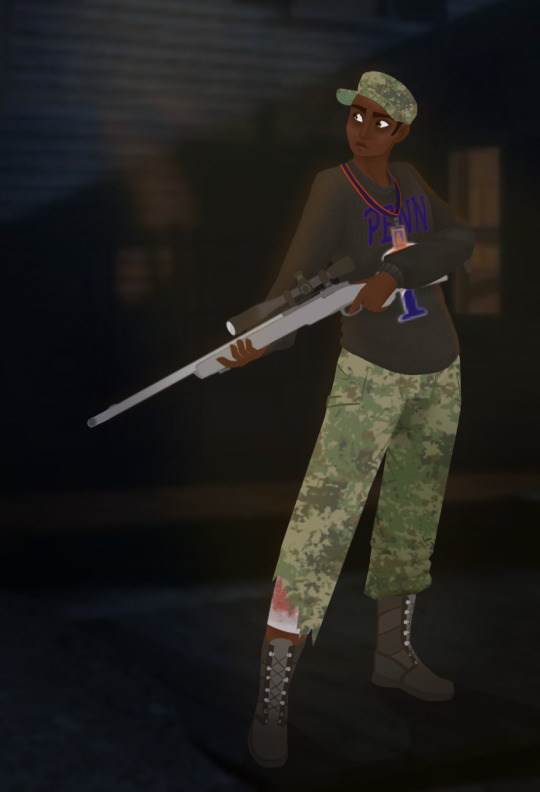
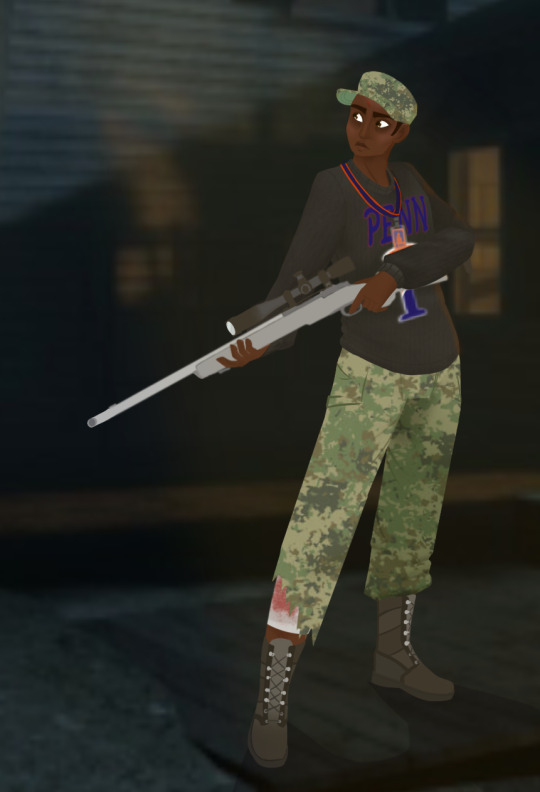
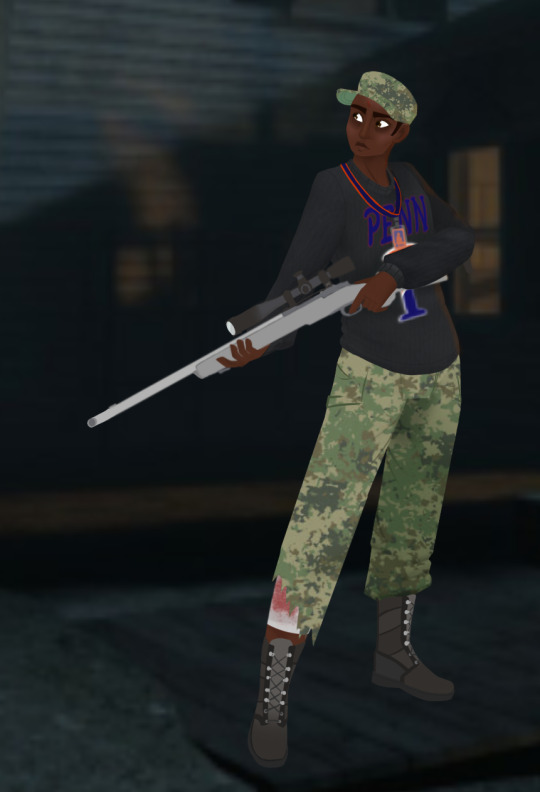
(Click for better quality)
First off, I want to thank you guys! I’ve gotten so many asks since my last character swap and I’m so excited to do all of them! This one wasn’t the first one I got out of them, just the one I had the most ideas for (plus, eyesoverinfinity is a return asker).
Since Bill’s main descriptor is that he’s a veteran specifically, the goal was to consider what would push someone like Louis into active duty, how would they walk away from that, and what would their goals be after it— especially at his age. I figured that he would be someone who joined the military for “smart” reasons, originally with the intention getting into a good school through his time in the military. There are a lot of military programs that pay for college, or give experience and act as an internship. I think he joined the military not expecting to see active duty and got suddenly flung into it. Similar to Bill, I think an injury is what got him discharged, one that had him had him in and out of the hospital for a good while after returning home. He eventually got his life back on course, either got a job at a university, got into a university, or both— either way he’s chugging along and was doing pretty well. And then the apocalypse happened.e
Despite these events, his cheerful outlook on life hasn’t been visibly shaken. His goal is not only to keep his team alive, but to keep the others with him happy as well, not daring to show how worried he actually is until he’s alone. He realized moral was incredibly important in what someone is willing to do, and an unhappy team is more likely to give up. His leadership skills are more advanced, but in a way that’s meant to keep the people around him moving. He’d be able to push back against the team pessimist more so than canon Louis does, and will try to get conversation to happen if the group has been quiet for too long. He’d be more involved with banter than Bill, but he mainly aims for people to look to the future rather than the past, avoiding conversation about things from before the apocalypse. An ultimate goal-getter, he would be dedicated to figuring out ways that they can live normally and find positives to every fallen camp (‘Well, now we know how Not to do it!’) or stroke of bad luck (‘We tried our best, we need to keep going.’) I imagine that like Bill, and despite his optimistic words, he would also not slow the train down for the doctor in the Sacrifice comic, though he’d do more to try to prevent anyone from being off the train before it starts moving. He doesn’t want to admit it out loud, but once a situation is beyond saving, he kind of gives up on it.
In summary, he’s cheerful and inclusive around others, but very pessimistic about the world when alone.
Now here’s the swap’s name — Louis as Bill is Lloyd. Louis means famous warrior, William means protector among other things. I see Lloyd as a good combination of the two, meaning sacred, but also gray-haired. I think bringing up the hair is good since one of the meanings of William is helmet.
Thank you for reading, I’ll try to have the other requests out ASAP (I got a new one very recently that I’m excited about), and my ask box is still open to more ^^
#l4d#left 4 dead#character mashup#left 4 dead 2#nat’s art#Louis left 4 dead#bill left 4 dead#once again if there’s anything else you want to know my ask box is open ^^#Full name Lloyd Seymour
19 notes
·
View notes
Text
Neutralised (1994) [2/?]: Characters Full Names & Nicknames (& Actors)

Andreina Diletta Neri 'Andi' - Robin Wright
Abraham Salvador Varela Machado 'Abe/Bram' - Alfred Molina
Caleb Joseph Willow 'Cal/C.J' - Cary Elwes
Dove January Lewis 'D.J' - Alfre Woodard
Esmé Poppy Verity - Janeane Garofalo
Faustus Genghis Sanchez Blanco 'Faust' - Hank Azaria
Grayson Newton Bryant 'Gray' - Harold Perrineau
Hunter Tanner Kingsley 'King' - Chris Farley
Ichabod Thanatos Mortimer - Danny DeVito
Jared Reed Foster 'J.R' - Kirk Acevedo
Kane Rayner Carter 'K.C' - Philip Seymour Hoffman
Lance Raphael Carter - John Goodman
Monday Lijsbeth Duke 'Mona/Mona Lisa' - Patricia Arquette
Noam Dexter Gold - Oliver Platt
Omega Dorian Finch -Willem Dafoe
Peyton Rhea Blythe - Regina King
Russel Montana Warszawski 'Russ' - Adam Sandler
Sullivan Merritt Landon 'Sully' - Christopher Lloyd
Tuesday Jantine Duke 'T.J' - Reese Witherspoon
Victor Marley Jamison 'Vic' - Mike Myers
Winslow Miller Warszawski - Brad Garrett
Xavier Phoenix Solomon - David Spade
Yancy Myron Haggard - Kiefer Sutherland
Zoey Maitland Knight - Geena Davis
#original character#original characters#original writing#original series#Neutralised#alfred molina#tagging only alfred because i hope the molina girlies like bram
0 notes
Text
Favorite First Viewings of August 2020
The 5,000 Fingers of Dr. T (1953) (dir. Roy Rowland)
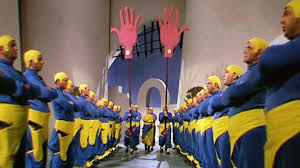
A bright, bold, surreal musical about a boy who wakes to find himself trapped in a bizarre dystopia where he and a bunch of other kids are forced to play the piano for a dictator. The set design is creative, the characters are weird, and Dr. Seuss’ script is delightful, showcasing humanity’s fear of tyranny post-World War II all while being as playful and childlike as it could be.
All About Eve (1950) (dir. Joseph L. Mankiewickz)

“Fasten your seatbelts, it’s going to be a bumpy night.” Bette Davis is a pure movie star, and she owns it in All About Eve as Margo Channing, a Broadway actress trapped in a sexist industry that decides it’s done with its leading ladies when they turn 40, and forces them to compete with younger stars, like Eve Harrington. A hilarious, catty, and yet dark look at the entertainment world.
Born in Flames (1983) (dir. Lizzie Borden)
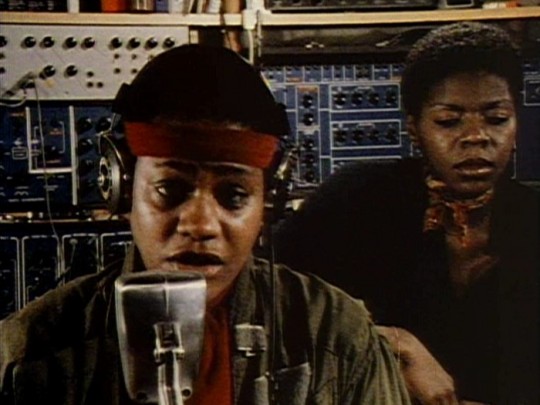
An Afrofuturist film, a look at a future that shows that a revolution did happen, but morphed into neoliberalism. It successfully showcases the rage that Black queer women had felt, how they were ignored, and how they plan to revolt again for true equality. I love how the documentary-style filmmaking intersects news footage telling people how great everything is with the injustices of America, particularly that through bosses and police officers.
Elephant (2003) (dir. Gus van Sant)

A cold, minimalist film, one that’s about a school shooting in Portland, Oregon, based off of the tragic Columbine massacre. The violence and the shootings are not romanticized by any stretch of the imagination, as the kids are shown as the uncool, Nazi sympathizing dumbasses with guns that they are. I like to believe that the tracking shots on the kids who are eating lunch, walking from place to place, and developing photographs are Van Sant and cinematographer Harris Savdies’ tribute to the kids who lost their lives.
Losing Ground (1982) (dir. Kathleen Collins)

Kathleen Collins’ semi-autobiographical film, one that shows the struggles that people can go through anytime they date self-important male artists. How they are not treated with respect and are seen as getting in the way of the man’s art, and when they manage to get away from that toxic environment, they become happier. The costume design and color palettes are to die for.
Millennium Actress (2001) (dir. Satoshi Kon)

Another film to add to my favorite genre, “Falling in love in a short amount of time.” Gorgeously animated, and full of ache and longing. It perfectly showcases that quest to feel that same brief moment of bliss and love that you felt as a young person. The work you put into your art stems from the desire to be loved again, as well as from the heartbreak you experienced. Much like Kon’s previous film Perfect Blue, the lines between reality and fantasy are blurred, but the emotion that is felt is the viewer’s guide to understanding where Chiyoko is in her life.
Night Moves (2013) (dir. Kelly Reichardt)
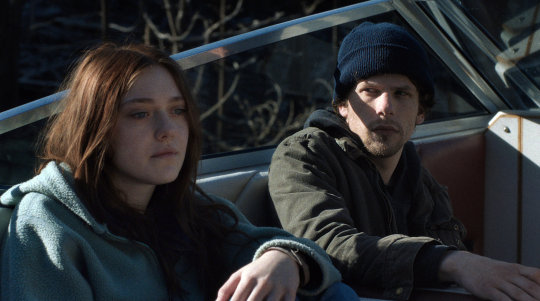
What starts as a thriller about three environmentalists and their plan to blow up a dam turns into a crushing study about the nature of guilt and how it affects the human body and mind. One of Jesse Eisenberg’s best performances, as he perfectly plays a character who tries to remain calm and collected yet constantly lets his own negative emotions and dark impulses get the best of him, and Reichardt’s direction and Christopher Brauvelt’s cinematography showcases a lonely, cold world for the characters of Josh and Dena.
Rafiki (2018) (dir. Wanuri Kahu)

A sweet, lovely Kenyan romance between two women, and much like Gus van Sant’s My Own Private Idaho, it deals with the choice of being able to truly express yourself and conforming in a town that hates you but you must conform to in order to survive comfortably. The colors and lighting pop, and the last conversation between Kena and Ziwi is just beyond heartbreaking.
Safety Last! (1923) (dir. Sam Taylor & Fred C. Newmeyer)
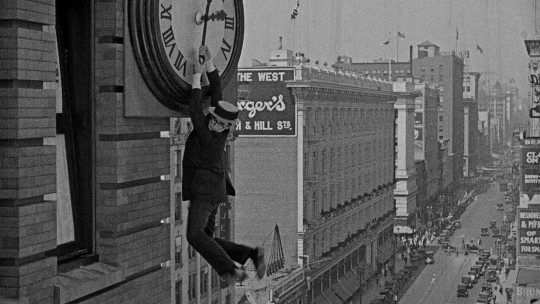
An iconic silent comedy, with Harold Lloyd’s innocent charm and cute glasses and hat making him one of the greatest figures of classic Hollywood. Best remembered for its climb up the clock tower, which is still one of the most thrilling moments in film history.
Sherlock Jr. (1924) (dir. Buster Keaton)
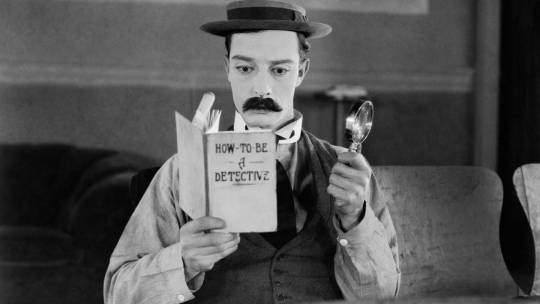
Another silent classic, with Buster Keaton arguably being the greatest stuntman of all time. Silent films are some of the greatest uses of the visual medium, as Keaton’s timing as a comic actor is pitch-perfect, and his direction allows him to perfectly sync up his stunts to the score. I love how heroic he tries to be in this one, imagining himself as the world’s greatest detective so he can finally impress the woman he loves and clear his name.
Shirley (2020) (dir. Josephine Decker)

One of my favorite films of the year so far. A surreal, swampy, sweaty look into the life of Shirley Jackson as seen through two friends of hers that move into her house. I love the way it explores mental illness and isolation. Even though Jackson was a writer worth taking seriously, her husband’s need to control her and her colleagues’ way of shutting her out because her depression is too much for them to handle is heartbreaking. Shirley and her roommate Rose’s relationship is complex and showcases a mutual bond born out of their frustration with their spouses.
Sun Don’t Shine (2012) (dir. Amy Seimetz)

There are no logos or opening titles in Sun Don’t Shine, the film puts you immediately in the violent and worst parts of Crystal and Leo's relationship. Seimetz's direction and use of close-ups on Crystal and Leo's face show an abusive relationship you can't look away from. And yet, those same close-ups show an intimacy that is there, showing how Crystal can fall for Leo's abuse, as his face is full of faux innocence and false love. Now that we know what a garbage human being ex-partner Shane Carruth turned out to be, this movie only becomes scarier as a result. A strong feature debut from director Amy Seimetz, I'm even more excited for She Dies Tomorrow.
Synecdoche, New York (2008) (dir. Charlie Kaufman)

A film about a crushing loneliness that follows theater director Caden Cotard. He can’t maintain a loving relationship with his wife, his daughter, or even close friends because all he can think about how he can use these moments shared with them in his art. If we ever met Caden, we could see him as an asshole, but Philip Seymour Hoffman brings such tenderness and vulnerability to this character, making it one of his greatest performances. A surreal, saddening film, with a final shot and line that will be burned into my brain forever,
Totally Fucked Up (1993) (dir. Gregg Araki)
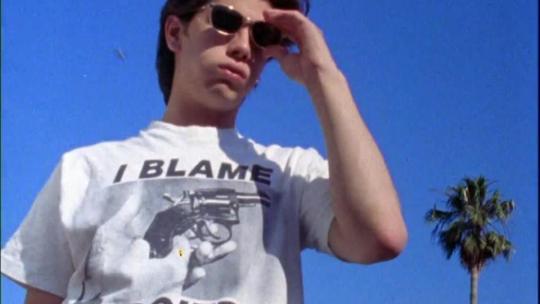
Gregg Araki’s follow-up to The Living End shows a group of disillusioned gay teenagers, their loneliness and sadness. A beautiful lo-fi aesthetic and a script that perfectly captures the real-life angst these Gen X queer teens had went through, as well as the violence and hatred that was inflicted upon them. One of the saddest endings I can remember.
#5000 fingers of dr t#roy rowland#all about eve#bette davis#born in flames#lizzie borden#elephant#gus van sant#losing ground#kathleen collins#millennium actress#satoshi kon#night moves#kelly reichardt#rafiki#wanuri kahu#safety last#harold lloyd#sherlock jr#buster keaton#shirley#josephine decker#elisabeth moss#sun don't shine#amy seimetz#synecdoche new york#charlie kaufman#totally fucked up#gregg araki
24 notes
·
View notes
Text
Slept Ons: The Best Records of 2020 That We Never Got Around To
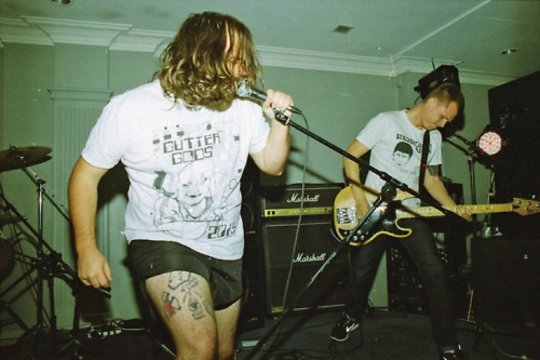
Tattoos and shorts! How did we miss the Oily Boys?
It happens pretty much every year. After much fussing and second-guessing, the year-end list gets finalized, set in stone really, encapsulating 12 months of enthusiastic listening, and surely these are the best ten records anyone could find, right? Right? And then, a day or a week later, someone else puts up their list or records their year-end radio show, and there it is, the record you could have loved and pushed and written about…if only you’d known about it. My self-kick in the shins came during Joe Belock’s 2020 round-up on WFMU when he played the Chats. Others on our staff knew, earlier on, that they weren’t writing about records they loved for whatever reason — work, family, mp3 overload, etc. Except now they are. Here. Now. Enjoy.
Contributors include me (Jennifer Kelly), Eric McDowell, Jonathan Shaw, Justin Cober-Lake, Bill Meyer, Bryon Hayes, Ian Mathers, Andrew Forell, Michael Rosenstein and Patrick Masterson.
The Chats — High Risk Behavior (Bargain Bin)
High Risk Behaviour by The Chats
Cartoonishly primitive and gleefully out of luck, The Chats hurl Molotov cocktails of punk, bright and exploding even as they come. They’re from Australia, which totally makes sense; there’s a sunny, health-care-subsidized, devil-may-care vibe to their down-on-their luck stories. Musically, the songs are stripped down like Billy Childish, sped up like the Ramones, brute simple like Eddy Current Suppression Ring. Most of them are about alcohol: drinking, being drunk, getting arrested for being drunk, eating while drunk…etc. etc. But there’s an art to singing about getting hammered, and few manage the butt-headed conviction of “Drunk & Disorderly.” Its jungle rhythms, vicious, saw-toothed bass, quick knife jabs of guitar frame an all-hands drum-shocked chant: “Relaxation, mood alteration, boredom leads to intoxication.” Later singer Eamon Sandwith cuts right to the point about romance with the couplet, “I was cautious, double wrapped, but still I got the clap.” The album’s highlights include the most belligerently glorious song ever about cyber-fraud in “Identity Theft,” whose shout along chorus buoys you up, even as the dark web drains your savings account dry. The album strings together a laundry list of dead-end, unfortunate situations, one after another truly hopeless developments, but nonetheless it explodes with joy. Bandcamp says the guitar player has already left—so you’re too late to see the Chats live—but it must have been fun while it lasted.
Jennifer Kelly
Oliver Coates — skins n slime (RVNG Intl)
skins n slime by Oliver Coates
2020 was a year of loss, of losing, of feeling lost. Whether weathering the despair of illness and death, the discomfort of displacement or the drift of temporal reverie, English cellist Oliver Coates creates music to reflect all this and more on skins n slime. Using modulators, loops and effects, Coates employs elements from drone, shoegaze and industrial to extend the range of the cello and conjure otherworldly sounds of crushing intensity and great beauty. Beneath the layering, distortion and dissonance, the human element remains strong. The tactility of fingers and bow on strings and the expressive essence of tone form the core of Coates composition and performance. If his experiments seem a willful swipe at the restrictions of the classical world from whence he came, the visceral power of a track like “Reunification 2018”, which hunkers in the same netherworld as anything by Deathprod or Lawrence English, the liminal, static bedecked ache of “Honey” and the unadorned minimalism of “Caretaker Part 1 (Breathing)” are works of a serious talent. skins n slime is an album to sit with and soak in; allow it to percolate and permeate and you’ll find yourself forgetting the outside world, if only for a while.
Andrew Forell
Bertrand Denzler / Antonin Gerbal — Sbatax (Umlaut Records)
Sbatax by Denzler - Gerbal
Tenor sax player Bertrand Denzler and drummer Antonin Gerbal released this duo recording last summer which slipped under the radar of many listeners. Denzler is as likely to be heard these days composing and performing pieces by others in the French ensemble ONCEIM, playing solo, or in settings for quiet improvisation. But he’s been burning it up as a free jazz player for years now as well. Gerbal also casts a broad net, as a member of ONCEIM, deconstructing free bop in the group Peeping Tom, or recontextualizing the music of Ahmed Abdul-Malik along with Pat Thomas, Joel Grip and Seymour Wright in the group Ahmed amongst many other projects. The two have worked together in a variety of contexts for a decade now, recording a fantastic duo back in 2014. Sbatax, recorded five years later at a live performance in Berlin is a worthy follow-up.
Gerbal attacks his kit with ferocity out of the gate, with slashing cymbals and thundering kit, cascading along with drubbing momentum. Denzler charges in with a husky, jagged, repeated motif which he loops and teases apart, matching the caterwauling vigor of his partner straightaway. Over the course of this 40-minute outing, one can hear the two lock in, coursing forward with mounting intensity. Denzler increasingly peppers his playing with trenchant blasts and rasping salvos, riding along on Gerbal’s torrential fusillades. Throughout, one can hear the two dive deep in to free jazz traditions while shaping the arc of the improvisation with an acute ear toward the overall form of the piece. Midway through, Denzler steps back for a torrid drum solo, then jumps back in with renewed dynamism as the two ride waves of commanding potency and focus to a rousing conclusion, goaded on by the cheering audience. Anyone wondering whether there is still life in the tenor/drum duo format should dig this one up.
Michael Rosenstein
Kaelin Ellis — After Thoughts (self-released)
After Thoughts by KAELIN ELLIS
To be sure, “slept on” hardly characterizes Kaelin Ellis in 2020. After a trickle of lone tracks in the first months of the year, a Twitter video posted by the 23-year-old producer and multi-instrumentalist caught the attention of Lupe Fiasco, quickly precipitating the joint EP House. It’s a catchy story from any number of angles — the star-powered “discovery” of a young talent, the interconnectedness of the digital age, the silver linings of the COVID-19 pandemic — but it risks overshadowing Ellis’s two 2020 solo records: Moments, released in the lead-up to House, and After Thoughts, released in October. It doesn’t help that each album’s dozen tracks scarcely add up to as many minutes, or that the producer’s titles deliberately downplay the results. And some, of course, will judge these jazzy, deeply soulful beats only against their potential as platforms for some other, more extroverted artist. “I’d like to think I’m a jack of all trades,” Ellis told one interviewer, “but in all honesty my specialty is creating a space for others to stand out.”
Yet as with all small, good things, there’s reward in savoring these miniatures on their own terms, and After Thoughts in particular proved an unexpected retreat from last fall’s anxieties. Ellis has a poet’s gift for distillation and juxtaposition, a director’s knack for pathos and dramatic sequencing — powers that combine to somehow render a fully realized world. As fleeting as it is, Ellis’s work communicates a generosity of care and concentration, opening a space for others not just to stand out but also to settle in.
Eric McDowell
Lloyd Miller with Ian Camp and Adam Michael Terry — At the Ends of the World
At the Ends of the World by Lloyd Miller with Ian Camp and Adam Michael Terry
Miller and company fuse the feel of a contemporary classical concert with eastern modalities and instrumentation. The recordings sound live off the floor, and give a welcome sense of space and detail to the sensitive playing. Miller has explored the intersection between Persian and other cultural traditions and jazz through the lens of academic scholarship and recorded output since the 1960s. With this release, the performances linger in a space where vibe is as important as compositional structure. The results revel in the beauty when seemingly unrelated musical ideas emerge together in the same moment, with startling results.
Arthur Krumins
Oily Boys — Cro Memory Grin (Cool Death)
Cro Memory Grin by Oily Boys
The title of this 2020 LP by Australian punks Oily Boys sounds like a pun on “Cro-Magnon,” an outmoded scientific name for early humans. It’s apt: the music is smarter than knuckle-dragger beatdown or run-of-the-mill powerviolence, but still driven by a rancorous, id-bound savagery. The smarts are just perceptible enough to keep things pretty interesting. Some of the noisier, droning and semi-melodic stretches of Cro Memory Grin recall the records made by the Men (especially Leave Home) before they decided to try to make like Uncle Tupelo, or some lesser version of the Hold Steady. Oily Boys inhabit a darker sensibility, and their music is more profoundly bonkers than anything those other bands got up to. Aggro, discordant punk; flagellating hardcore burners; psych-rock-adjacent sonic exorcisms — you get it all, sometimes in a single five-minute passage of Cro Memory Grin (check out the sequence from “Lizard Scheme” to “Heat Harmony” to “Stick Him.” Yikes). A bunch of the tunes spill over into one another, feedback and sustain jumping the gap from one track to the next, which gives the record a live vibe. It feels volatile and sweaty. The ill intent and unmitigated nastiness accumulate into a palpable force, tainting the air and leaving stains on your tee shirt. Oily Boys have been kicking around Sydney’s punk scene since at least 2014, but this is their first full-length record. One hopes they can continue to play with this degree of possessed abandon without completing burning themselves to down to smoldering cinders. At least long enough to record some more music.
Jonathan Shaw
Dougie Poole — The Freelancer's Blues (Wharf Cat)
The Freelancer's Blues by Dougie Poole
A cursory listen might misconstrue the heart of Dougie Poole's second album, The Freelancer's Blues. When he mixes his wobbly country sound with lyrics like those in “Vaping on the Job,” it sounds like genre play, a smirking look at millennial life through an urban cowboy's vintage sound. Poole does target a particular set of issues, but mapping them with his own slightly psychedelic country comes with very little of the postmodern itch. His characters feel just as troubled as anyone coming out of 1970s Nashville, and as Poole explores these lives with wit and empathy, the songs quickly find their resonance.
The album, though it wouldn't reach for pretentious terms, carries an existential problem at its center. Poole circles around the fundamental void: work deadens, relocation doesn't help, spiritual pursuits falter, intelligence burdens, and even the drugs don't help. When Poole finally gets the title track, the preceding album gives his confession extra weight, a mix of life's strictures and personal limitation combining for a crisis best avoided but wonderfully shared. The Freelancer's Blues comes rich in Nashville tradition but finds an ideal fit in its contemporary place, likely providing a soundtrack for a variety of times and spaces yet to come.
Justin Cober-Lake
Schlippenbach Quartett — Three Nails Left (Corbett Vs. Dempsey)
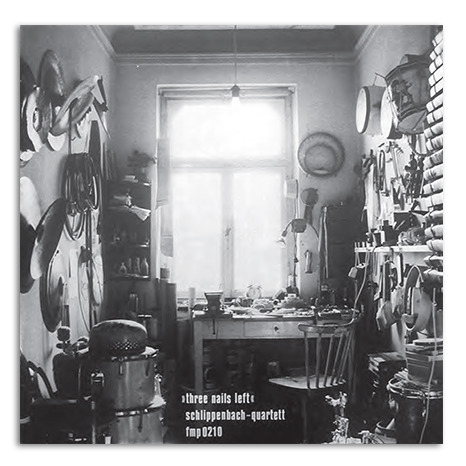
You might say that this record has been slept on twice. The second recording to be released by the Alexander von Schlippenbach, Evan Parker and Paul Lovens (augmented this time by Peter Kowald) was released in 1975, and didn’t get a second pressing — on vinyl — until 2019. So, Corbett Vs. Dempsey stepped up last summer, it had never been on CD. But this writer was so stumped on how to relate how intense, startling, and unlike any other free improvisation it was and is, that he just… slept on it. Until now. Even if you know this band, if you don’t know this album, well, it’s time you got acquainted.
Bill Meyer
Stonegrass — Stonegrass (Cosmic Range)
STONEGRASS by Stonegrass
Released on the cusp of a tentative re-opening for the city of Toronto after two months of lock-down, this slab of psychedelic funk-rock was the perfect antidote to the COVID blues when it arrived at the tail end of a Spring spent in near-isolation. The jam sessions that became Stonegrass were also a new beginning for multi-instrumentalist Matthew “Doc” Dunn and drummer Jay Anderson, who reignited a spirit of collaboration after a decade of sonic estrangement following the demise of their Spiritual Sky Blues Band project. Listening to these songs, you’d never know they spent any time apart. The tight, bottom-wagging jams on offer are evidence that these two are joined together at the third eye. Anderson’s grooves run deep, and Dunn — whether he’s traipsing along on guitar, keys or flutes — is right there with him. There’s enough fuzz here to satiate the heads, but the real treat here is the rhythmic interplay. Strap in and prepare to get down.
Bryon Hayes
Bob Vylan — We Live Here EP (Venn Records)
youtube
Bob Vylan flew under the radar in 2020 successfully enough that when someone nominated them for the best of 2020 poll in Tom Ewing’s Peoples’ Pop Polls project on Twitter (each month a different year or category gets voted on in World Cup-style brackets, it’s great fun and only occasionally maddening), most of the reaction was “is that one a typo?” Nobody had that response after listening to “We Live Here” — my wife also participates in the poll, so we just play all the candidates in our apartment, and Bob Vylan was the first time both of our jaws dropped in amazement; the song got played about ten times in a row at that point. Bobby (vocals/guitar/production) and Bobbie (drums/“spiritual inspiration”) Vylan’s 18-minute EP lives up to that title track, fireball after fireball aimed directly at the corrupt, crumbling, racist state that seems utterly indifferent to human suffering unless there’s profit in it. Whether it’s the raging catharsis of the title track or the cool, precise hostility of “Lynch Your Leaders,” Bob Vylan have made something vital and essential here, that very much speaks to 2020 but sadly will stay relevant long past it.
Ian Mathers
Working Men’s Club — Working Men’s Club (Heavenly Recordings)
youtube
It’s been evident these past few years that I’ve retreated from music and committed myself to the slower world of books as a way of giving my mind a break from the accelerating madness outside, but I could never really leave my radio family the same way I could never really leave Dusted. Another great example why: A fellow CHIRP volunteer played “John Cooper Clarke” in a December Zoom social I actually managed to catch, and I’ve been addicted to Working Men’s Club’s debut LP from October ever since. The quartet hails from Todmodren, a market town you won’t be surprised upon listening to discover is roughly equidistant between Leeds and Manchester; the album screams Hacienda vibes in its seamless integration of post-punk signifiers and dancefloor style. It’s easy to bandy about names from Rip It Up and Start Again or even The Velvet Underground in 12-minute closer “Angel,” certainly one of the most arresting tracks of the year, but the thing that struck me immediately is that this was the record I’d always anticipated but never got from Factory Floor — smart, aloof and occasionally calculated, yet still fun enough to play for any crowd itching to move. Until the community of a dance party or Working Men’s Club live set is once again possible, patience and a fully formed first album will have to suffice. You’ll have to imagine the part where I corner you at the party to rave about it, I’m afraid.
Patrick Masterson
#yearend 2020#the chats#jennifer kelly#kaelin ellis#eric mcdowell#oily boys#jonathan shaw#dougie pool#justin cober-lake#schlippenbach quartett#Bill Meyer#oliver coates#andrew forell#stonegrass#bryon hayes#bob vylan#ian mathers#working men's club#patrick masterson#dusted magazine#slept ons#michael rosenstein#Bertrand Denzler#Antonin Gerbal#lloyd miller#arthur krumins
5 notes
·
View notes
Text
Humans And Pets
“ We have learned already that the Humans keep domesticated animals as their companions, whether it be a four legged canine, a feline or a small water based creature that is more orange than gold. The humans on our ship have these animal companions, Human Alisha has a feline while Human Josh has his *ahem* ‘Hellhound’ Satan and his other canine. . .I need to speak with the Corps as to why we are allowing Human Josh to have responsibility for other life. . .His other canine is much bigger than the ‘Hellhound’ and goes by ‘Stark.’ though Human Josh has recently informed me that his full name is ‘Stark Tony.’ a reference I’m sure. But we have recently discovered that humans will keep just about anything as a pet, including dangerous reptiles, insects and some plants.
Our new Technician, Jason Lloyd another human was recently rescued and cleared to join our ship and he brought along his pets, a plant called a ‘Venus Fly Trap.’ called ‘Steve.’ which through years of evolution and breeding, can be used to protect a household when they grow to their full size of 5ft and require a diet of small rodents, they can be tamed and domesticated obviously, otherwise I do not think the Corps would have cleared that, the other Humans keep referring to Jason as ‘Seymour.’ now and in a rather sinister tone I’ve heard them impersonate the plant, usually by saying ‘Feed me Seymour.’ but I digress, he also owns a Ball Python. . .Which he claims his younger sibling named ‘Bill Nython.’ which also lives in a diet of small rodents and which makes me wonder if Human Josh’s tiny ‘Hellhound.’ would be counted as a rodent.
My point of this recording is that we are currently on our way to having more Earthling animals than Humans if the Corps continues to allow the humans to keep their pets, however perhaps that is not a bad thing, Bill Nython is a rather calm creature and it is fascinating to observe in it’s habitat and Stark Tony is a much calmer and friendlier animal than Satan. This has been Commander W’onz of the Space Corps Exploration Ship G-1867b, signing off. ” - Commander W’onz, slowly coming around to the concept of the humans animal companions.
#tales from the bfs#humans are weird#humans are space orcs#humans are space oddities#i imagine in the future#we will have venus fly traps as the new guard dog#bill nython
376 notes
·
View notes
Photo

New Post has been published on http://www.classicfilmfreak.com/2018/03/22/20624/
Young Winston (1972) starring Robert Shaw, Anne Bancroft and Simon Ward
Indolent student, Bore War soldier, prisoner, fugitive and Member of Parliament—all from the life of a young Winston Churchill before the age of 27.
The critically successful Darkest Hour (2017) concentrates on Winston Churchill’s leadership during the Dunkirk retreat and evacuation in World War II. Young Winston, made almost half a century earlier, represents a somewhat broader time span in the great man’s life, from boyhood to his first parliamentary election in 1900.
The release of the British film in 1972 was partly the result of a renewed interest in Churchill’s life, inspired by his passing in January of 1965. Some people saw his death as the last vestige of the glorious British Empire, though, in every practical sense, the Empire had ended with World War I. Then called “the Great War,” who could know there would be one even more catastrophic! To historians and intuitive citizens at the time, the Empire’s decline had already begun by the turn of the twentieth century.
With England’s antiquated film industry in the 1930s, it was Hollywood which championed that country’s past—its mastery of the seas, its imperialistic success (and arrogance), most evident in its abuse of India, and its amassing an empire upon which the sun never set.
(adsbygoogle = window.adsbygoogle || []).push();
Hollywood made Mutiny on the Bounty in 1935 and its remake in 1962. It filmed The Charge of the Light Brigade (1936), climaxed by the infamous British blunder in the Crimean War. The studios seemed fascinated by the British exploits in India: Clive of India (1935), The Lives of a Bengal Lancer (1935) andGunga Din (1936).
In 1940, it was Hollywood which contrived a morale-building script for the Errol Flynn swashbuckler The Sea Hawk, relating its story of King Philip II’s sixteenth-century Armada to England’s current attacks by Hitler’s Luftwaffe. In much the same way, Mrs. Miniver (1942) extolled the bravery of the island’s citizens against Nazi fighters and their courage and national pride during the evacuation from Dunkirk.
From the ’60s to ’80s, before epics became largely too expensive, the British themselves began glorifying their past on film, either on their own or, usually, with American financial backing. They made Lawrence of Arabia in 1962 and remade The Charge of the Light Brigade in 1968. Khartoum (1966), about another Empire misadventure, now in the Sudan, stars an American, Charlton Heston, as Englishman General Charles George Gordon, the central character, but it is a Brit, Laurence Olivier, as Gordon’s nemesis, the Mahdi, the supposed redeemer of Islam, who, in history, does him in and, on screen, out-acts him.
And there is always the British indulgence in the Edwardian period and its attempted continuance, at least in thought and spirit. Film scholar Leslie Halliwell refers to the E. M. Forster adaptations of A Passage to India (1984), A Room with a View (1985) and Howards End (1991) as “filmed in a mood of nostalgic Edwardiana.” This can also be applied to the milieu of many other British films that relive the past—Chariots of Fire (1981) and The Remains of the Day (1993).
More recently, Edwardian aristocratic life is microscopically detailed in the British TV series Downton Abbey (2011-2016 on PBS). The six-year-long screen diversion begins in 1912 with the sinking of the Titanic and ends in 1926; in between comes World War I, the rude intrusion of the modern age, British estate taxes and the dissolution of most of the landed gentry.
Young Winston, which takes places in both the Victorian and Edwardian periods, has a fine ensemble cast—all British save American Anne Bancroft as Churchill’s beautiful mother, Jennie. It can only be assumed that John Gielgud was otherwise occupied, reason he didn’t join the impressive cast of Robert Shaw, Jack Hawkins and John Mills and Patrick Magee as two generals.
There is also Edward Woodward, Robert Hardy (who would play Churchill in five separate British TV series), Laurence Naismith, Colin Blakely (a reliable Dr. Watson to Robert Stephens’ detective in The Private Life of Sherlock Holmes, 1970), Jane Seymour, Anthony Hopkins (here as Lloyd George), Nigel Hawthorne and Ian Holm (the athletic trainer in Chariots of Fire).
Relative newcomer at the time, Simon Ward is the mature, mid-twenties Churchill. Two other child actors play Churchill at seven and thirteen, and Ward dubbed the voice of the thirteen-year-old (Michael Audreson). Ward was deprived, for whatever the reasons, of any great movie success, and the small part in the poorly drawn Hitler: The Last Ten Days (1973) somehow symbolizes his career.
The story line of the film moves from 1881 to 1901, the year the namesake of that age, Edward VII, came to the throne. When the movie opens, for it is a flashback with a reflective Winston narrating, it is already 1897 and the twenty-four-year old is in India. As a journalist for London’s Daily Telegraph, he craves battlefield glory and a writer’s fame.
While he is annoying the commander, Lord Kitchener (Mills), who cries out, “Who’s that bloody fool on the gray?,” Winston recalls his life in a boarding school. Lonely, he writes his parents fallacious letters that everything is jolly fine. He repeatedly asks them to come and visit, but they rarely do. (At about the same time, an unhappy fifteen-year-old Franklin Roosevelt is also writing home, he from Groton School, about the “wonderful” time he, too, is having. In the 1940s, the two men’s lives would cross in a way that, some say, “saved the world.”)
When Winston is physically abused in the boarding school, it is “Wommy,” as the child calls his beloved nurse, Mrs. Everest (Pat Heywood), who insists to his mother, Lady Randolph, that he must be removed. Later, at the British military academy of Sandhurst, he proves a poor student.
His father, Lord Randolph (Shaw), while highly disappointed in his son’s performance yet professing love for him, begins acting erratically and becomes unreasonably angry toward him. Soon after he resigns as Chancellor of the Exchequer over an issue in Parliament, two doctors (Clive Morton and Robert Flemyng)—in a frank discussion, even for 1972—inform Lady Randolph that her husband is suffering from syphilis.
After Lord Randolph dies, money lost in the American stock market leaves the family destitute. Thanks to Jennie’s connections, Winston receives a commission in the British Army, which enables him to continue as a reporter, now for The Daily Mail.
His later transfer to the Sudan satisfies, at least for the moment, his appetite for action and bravery. When he warns Kitchener of advancing Muslim warriors, the Dervishes, he is regarded as more than a naive nuisance.
Back in England, thanks to pressure from Jennie, Winston runs for Parliament, but lack of experience and a stuttering speech impediment lead to defeat. At the start of the Boer War in 1899, Winston receives another military commission, now in South Africa. He is captured by the Boers and imprisoned, but miraculously escapes, hides on a train and eventually returns to England.
He is hailed as a hero and wins a seat in Parliament where he gives a resounding speech in the House of Commons. Soon afterward, Jennie, in discussing his future, happens—not so coincidentally, perhaps?—to introduce him to a young lady, soon-to-be wife Clementine Hozier.
Young Winston’s musical score, by Alfred Ralston, basically an arranger, is saved by the use of music of Sir Edward Elgar, the Edwardian composer par excellence. The Caractacus and Imperial marches enliven some battle scenes, the Pomp and Circumstance March No. 4 is fortunately substituted for the famous No. 1, everyone’s graduation march, and “Nimrod” from the Enigma Variations serves well whatever a composer needs a bit of ready-made British solemnity.
As a final footnote, actors who have played Winston Churchill over the years are copious, and a complete list is far beyond the limits here. One of the earliest names, Dudley Field Malone, is attached to Hollywood’s now notorious, pro-Russian propaganda, Mission to Moscow (1943).
Later come Patrick Wymark in Operation Crossbow (1965), Leigh Dilley in The Eagle Has Landed (1976), Howard Lang in the TV series Winds of War (1983), Albert Finney in the TV movie The Gathering Storm(2002)—title of the first of Churchill’s six-volume The Second World War, Timothy Spall in The King’s Speech(2010) and, most recently, Gary Oldman in Darkest Hour.
While these titles represent the Winston Churchill of World War II, Young Winston provides glimpses into the earlier life of this soldier, writer, historian and statesman. Already a full, exciting life at twenty-seven, Churchill’s next sixty-three years would make him world famous, with his unheeded warnings of the menace of Hitler and his defiant leadership of the British people during World War II.
youtube
0 notes